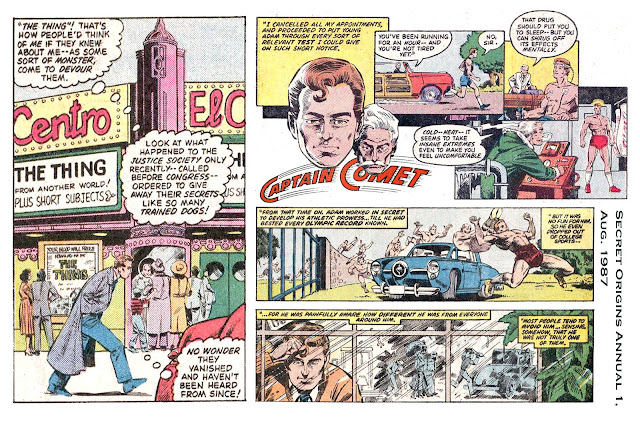September 1951: Mind Over Maiden
DC Comics editor Julius Schwartz
clearly had real respect and affection for knowledge-based professionals — so
much so that he even gave us the world’s first superhero librarian, Captain
Comet.
His fellow librarian, Lily
Torrence, kept a close eye on the mysterious Adam Blake. In Strange Adventures 12 (Sept. 1951),
Torrence tries to get Blake’s attention, asking him if he’s read this new book
on astronomy.
“Not yet, Miss Torrence,” he
replies, thinking, “But I have now.” His ‘futuristic brain” has permitted him
to absorb the book’s contents as he leafs through it.
Lily turns away tearfully,
thinking, “I-I hate him. He hardly seemed to listen when I spoke about the
book.”
Sensing he’s made her unhappy,
Blake remains stoic, observing that he can’t help the fact that he’s a
super-advanced mutant being. “Of course, it’s not Miss Torrence’s fault
either,” he thinks. “It’s just that no girl can ever hold my interest.”
That’s a twist I found
intriguing. Just consider — what if Superman regarded Lois Lane as inferior to
him, and of no real interest?
Today, we’d be tempted to make
something else of Captain Comet’s admission that “no girl can ever hold my
interest,” but in the context of the times it served only to underline Blake’s
loneliness — and to set the reader up for what would become a Silver Age
superhero convention, the distaff duplicate like Batwoman, Fly Girl and
Supergirl. Here, Comet’s female opposite number is the 19-year-old mutant Radea
of the planet Hyperba, The Girl from
the Diamond Planet.
In this story written by John
Broome and drawn by Murphy Anderson, the super-pair overthrow a planetary
dictator who’s running an alien precursor to the Hunger Games, establishing another Schwartz theme, the capable and
fully equal female partner.
Fourteen months later, in Strange Adventures 26, Captain
Comet would encounter his second beautiful,
futuristic superwoman, Miss Universe.





Comments
Post a Comment